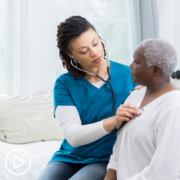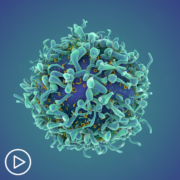How Can Myeloma Nurses Start Clinical Trial Conversations at Start of Care?
How Can Myeloma Nurses Start Clinical Trial Conversations at Start of Care? from Patient Empowerment Network on Vimeo.
What are some strategies for myeloma nurses to initiate clinical trial conversations at the outset of care? Advanced practice provider Charise Gleason explains methods her clinic has used for advanced practice providers and the improvements they have observed in their clinical trial participation rates.
Download Resource Guide | Descargar guía de recursos
Related Resources:

|

|

|
Transcript:
Dr. Nicole Rochester:
We’ve been talking about this team-based approach. We know that nurses serve as key coordinators of care in the myeloma trial setting, as well as other members of the healthcare team. So from your perspective, what are some recommended strategies that you can share to encourage advanced practice providers, specifically how to initiate the clinical trial conversation at the outset of care?
Charise Gleason:
First, we need to educate our advanced practice providers. So for new APPs coming into our system, part of their onboarding is the research mission, exposing them to the clinical trials, exposing them to what we have available. We have a weekly research meeting, I’m sure Dr. Cole has similar practices. And then our group has a separate meeting once a week, where we meet for two hours. The myeloma team, we have APPs who are off that day who call in for this meeting, because we go over our patients, we talk about what clinical trials are available, that’s just how we practice and we think about that.
I would like to add to that, referring to a center early is so essential as well, and for us to start having that conversation. And I’ll talk a little bit to build on something Dr. Cole said with our patient population.In Atlanta, in our database, 40 percent of our data is based on Black patients. And we enroll about 32 percent to 33 percent of Black patients on clinical trials. And what our work on trials has showed us too, if you give the same access to every patient, you have good outcomes and good outcomes for Black patients, if not better, than white patients. So we all need to be versed on that, whether you’re the research nurse, the clinic nurse, the physician, the advanced practice. And so we really do bring that approach to taking care of our patients.
And then, managing those side effects and having that open dialogue. So patients aren’t surprised by things. And I’ll use talquetamab (Talvey), for instance. We have a patient who is still on the original trial, who relapsed on a BCMA targeted therapy. Early on, these side effects were new to everybody. And she wanted to come off the trial month end. And it was that education piece and working with her, holding the drug, that now almost two years later, she’s still in remission, tolerating the drug. And so those are the stories and these are the experiences we have. We’re giving really good drugs on clinical trials, and patients are responding well.










